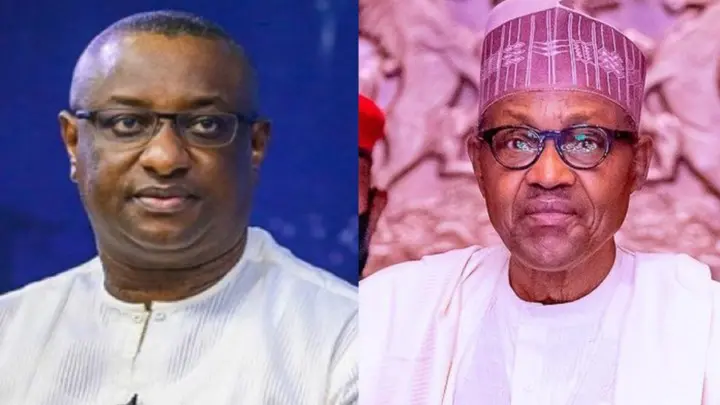Mr. Festus Keyamo who is Nigeria’s outgoing Minister of State for Labour and Employment, has called on the Federal Government to henceforth consider appointing different ministers to handle individual portfolios, stressing that the post of ‘minister of state’ was a Constitutional aberration.
Keyamo’s recommendation was contained in the valedictory speech he gave at the council chambers of the Presidential Villa, on Wednesday.
Africa Today News, New York reports that his suggestion was coming at a period elder statesmen and political analysts have called on the Federal Government to cut down on governance in line with Stephen Oronsaye’s white paper recommendation on public sector reforms.
The Oronsaye committee submitted an 800-page report on April 16, 2012, which recommended the abolition and merger of 102 government agencies and parastatals, while some were listed to be self-funding.
The report added that 263 of the statutory agencies should be reduced to 161,38 agencies should be abolished while 52 agencies should be merged.
It further recommended that 14 agencies should revert to departments in ministries.
But Keyamo put up an argument that the “Minister of State” portfolio is practically not working for many of those appointed for the post.
Read Also: PDP Is In Tatters, Their Plan Is To Hoodwink Judges – Keyamo
He noted that many appointed in such positions by successive governments have consistently refused to speak out for fear of sounding ungrateful to the Presidents who appointed them.
While stating that he doesn’t want to be seen in the light as an ingrate, the spokesman for the dissolved Tinubu-Shettima Presidential Campaign Council explained that the schedules of duties leave so many gaping holes that often pitch ministers against ministers of state.
The Schedules of Duties of Ministers and Ministers of State that intend to cure some of these anomalies hardly help the issues. Firstly, the Schedules of Duties are observed more in breach by the Permanent Secretaries and Directors who really cannot be expected to serve two masters. And in any case, many of the roles of both Ministers are so ambiguous that the bureaucrats would always interpret them to satisfy the ones they see as the “Senior Ministers” or “main Ministers” for fear of being persecuted by them.
According to him, the practice first surfaced in the First Republic where it was used as a contraption to give a semblance of “Government of National Unity”, when in actual fact, no “real power” was ceded to the opposition members co-opted into governance.
The ultimate goal of designating such opposition members Ministers of State, he argued, was to keep them in check under the leadership of the ruling Party’s Ministers.
Continuing, he said that over time the custom has come to stay and has been established as a norm, even regarding ministers from the same ruling party.
“In fact, one political absurdity that has emerged from this is that some Ministers of State won more votes from their States for the party in power than the “main Minister. As a result, many Ministers of State are largely redundant, with many going to the office for symbolic purpose and just to while away the time. Files are passed to them to treat only at the discretion of the other Minister and the Permanent Secretary. Yet, the Ministers of State will receive either praise or condemnation for the successes or failures of such Ministries.
“In addition, the provision that “Ministers of State” cannot present Memos in Council, except with the permission of the Minister, is another anomaly. It means the discretion of the Minister of State is subsumed in the discretion of the Minister, yet both of them represent different States in Cabinet. It also follows that it would be difficult to assess the individual performances of the Ministers of State since their discretion is shackled under the discretion of the Ministers. Original ideas developed by a Minister of State are subject to clearance by another colleague in Cabinet before they can sail through for consideration by Council. The drafters of our Constitution obviously did not intend this.
“In my case, whilst the schedule of my colleague had to do more with Labour and Productivity, mine had to do more with Employment. The Directorates in my Ministry that were under my office would then be fully under the Minister of Employment, without any double loyalty to the Minister of Labour and Productivity. We can also have a Minister of Trade and another Minister of Investment. We can have a Minister of Education (Tertiary) and another Minister of Education (Primary and Secondary); we can have a Minister of Mines and another Minister of Steel; we can have a Minister of Works and another Minister of Housing and so on.
“Obviously, the argument that two ministers are cramped into some ministries in order not to unnecessarily proliferate ministries and therefore save Government’s money is no longer tenable. This is because the present Ministers and Ministers of State have their separate offices, cars, security personnel and personal aides. So, what is the point?
“Finally, I want to place it on record again that Mr. Present gave me maximum support as his Minister to function optimally. This treatise is not a personal complaint. This is just a respectful recommendation for record purposes and for the sake of posterity. It is also intended to correct an anomaly that has existed for ages.”

